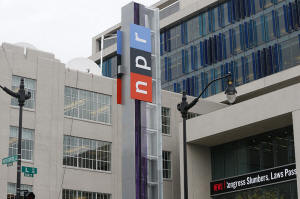Congressional Republicans target PBS, NPR funding in contentious hearing
[March 27, 2025]
By DAVID BAUDER
WASHINGTON (AP) — A House Republican pushing the Trump administration's
government efficiency efforts called for dismantling and defunding the
nation's public broadcasting system following a contentious hearing
Wednesday featuring the heads of PBS and NPR.
“We believe that you all can hate us on your own dime,” said Georgia
Rep. Marjorie Taylor Greene.
Coupled with President Donald Trump's declaration on Tuesday that he
would “love to” see federal funding cut off, the nation's public
broadcasting system is facing perhaps the biggest threat to its
existence since it was first established in 1967. The broadcasters get
roughly half a billion dollars in public money through the Corporation
for Public Broadcasting.
Republicans have frequently grumbled that PBS and NPR news programming
leans left, but efforts to cut or eliminate funding usually fade because
legislators want to protect their local stations — 336 of them for PBS
alone, with those in rural areas most heavily dependent on taxpayer
money.
The hearings on behalf of the new administration are one of multiple
front on which Trump and his allies are aggressively challenging and in
some cases sanctioning the American media, which the president has been
sharply critical of for years.
This week alone, he denounced The Atlantic repeatedly for publishing
texts from the Signal messaging app among high-ranking defense officials
planning a military attack. Trump has also taken action against the
Voice of America and other government-funded media and barred The
Associated Press from the White House press pool and other events.

An issue that's not going away quietly
A succession of GOP lawmakers on Wednesday complained bitterly about
alleged bias, particularly from NPR stations, making clear it was not an
issue that was going away quietly.
Kentucky Rep. James Comer said that as a young farmer decades ago he
would frequently listen to NPR broadcasts on his tractor, as it was
often his only option. But now, he has podcasts and other things to
listen to.
“I don't even recognize the station anymore,” Comer said. “It's not
news. It feels like it's propaganda. I feel like it's disinformation
every time I listen to NPR.”
Greene displayed a picture of what she called a “drag queen” that
appeared on a PBS program geared to children and complained about
documentaries featuring transgender people. PBS chief executive Paula
Kerger said the “drag queen” reference was about something mistakenly
put on the New York PBS station's website and never on the air. The
transgender people appeared as part of adult programming that reflected
the experiences of different Americans, she said.
Democrats characterized the hearing as a distraction from more important
issues, like this week's revelation that a journalist from the Atlantic
was included in a text chain of Trump administration officials detailing
a U.S. military strike in Yemen. “If shame was still a thing, this
hearing would be shameful,” said Massachusetts Rep. Stephen Lynch.
Some Democrats tried comedy. California Rep. Robert Garcia asked if the
red “Sesame Street” character, “is Elmo now, or has he ever been, a
member of the Communist Party?”
[to top of second column]
|

The headquarters for National Public Radio (NPR) stands on North
Capitol Street, April 15, 2013, in Washington. (AP Photo/Charles
Dharapak, File)

“He's a puppet,” Kerger said. “But, no.”
Admitting to some past mistakes
The broadcasting leaders acknowledged mistakes.
NPR President Katherine Maher said the radio network was wrong to
dismiss what was on Hunter Biden's laptop as a non-story. After they
were repeatedly referenced by Republicans on the committee, Maher
said she regretted posting some anti-Trump tweets before she began
working for NPR.
Although saying she is not responsible for editorial content, Maher
detailed efforts by NPR to ensure a variety of political viewpoints
are represented. NPR's weekly listenership declined from 60 million
to 42 million between 2020 and 2024, according to internal documents
published by The New York Times, although Maher said Wednesday those
numbers have inched up in the past year.
“I do not believe we are politically biased,” Maher said. “We are a
non-biased organization.”
Uri Berliner, a former NPR editor who quit last year after
complaining the news outlet had become too one-sided, wrote in the
Free Press on Wednesday that NPR should no longer accept taxpayer
money so it can “drop the public from its mission statement and
embrace the progressive."
“Don't try to conceal what everyone knows already,” he wrote.
Republican committee members noted that NPR has cited Wednesday's
hearing in fundraising appeals and Maher was asked whether the
system would survive without public money. “It would be incredibly
damaging to the national public radio system,” she said.
Kerger emphasized the service that PBS provides to local
communities, particularly with its educational programming for
children, and said she is worried for the future of its smaller
stations.
“This," she said, “is an existential moment for them.”
After the hearing, the Committee to Protect Journalists called NPR
and PBS essential public services for millions of Americans.
“Casting them as propaganda machines undeserving of taxpayer support
is a dangerous mischaracterization that threatens to rob Americans
of the vital reporting they need to make decisions about their
lives,” said Jodie Ginsberg, the committee's CEO.
___
David Bauder writes about media for the AP.
All contents © copyright 2025 Associated Press. All rights reserved
 |